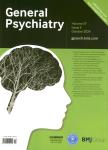Efficacy of repetitive transcranial magnetic stimulation in treatmentresistant depression:the evidence thus far
作者机构:Department of PsychiatryMental Health InstituteChandigarhIndia departm ent of PsychiatryKing George's Medical UniversityLucknowUttar PradeshIndia
出 版 物:《General Psychiatry》 (综合精神医学(英文))
年 卷 期:2019年第32卷第4期
页 面:167-174页
核心收录:
学科分类:10[医学]
主 题:magnetic stimulation treatmentresistant depression
摘 要:Depression is a common mental disorder, which attributes to significant morbidity, disability and burden of care. A significant number of patients with depression still remain symptomatic after adequate trials of antidepressant treatment as well as psychotherapy, which is often referred to as treatment-resistant depression. Neuromodulation techniques—like electroconvulsive therapy, vagus nerve stimulation, transcranial magnetic stimulation (TMS) and transcranial direct current stimulation, may be useful augmenting techniques in depression, mostly recommended for treatment-resistant cases. Robust evidence exists regarding the efficacy of electroconvulsive therapy in the management of treatment-resistant depression;however, other techniques are understudied. TMS has been increasingly studied in various psychiatric disorders including depression. It has been approved by the US Food and Drug Administration for use in major depressive disorder. Over the past two decades, TMS has been studied in diverse groups of the population with depression using several research designs. This article gives an overview of the efficacy of repetitive TMS in treatment-resistant depression with the recent evidence.



